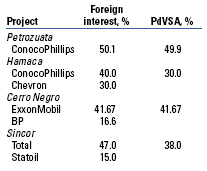Oil and gas in the Capitals
Chavez and the oil companies arm-wrestle over Venezuelan investments
May Day. Oil majors and stock investors are looking at May 1st nervously, since the Venezuelan government has set this date as the deadline for major oil companies to renegotiate contracts in the Orinoco basin. In early February, the Venezuelan legislature gave President Hugo Chávez long-expected special powers to rule by decree over the next year-and-a-half. This will enable Chávez to pass decrees on key sectors, such as banking, defense, energy, insurance, media and telecommunications. Investment status. The oil companies’ agenda is to stay in Venezuela, even if that means renegotiating the contracts. Not only have they already invested about $17 billion in the Orinoco, they also have sunk funds into derricks, facilities, fields and pipelines that collectively are estimated to now be worth over $30 billion. Moreover, the oil majors do not want to walk away from what some industry experts believe could be the largest
Irrespective of what other countries may have invested or promised to invest, and despite significant tension between the US and Chávez, Venezuela is unlikely to expel Western firms. The funds that Western companies have invested far outweigh what China, Iran or Russia have invested. Additionally, even if Iran, China or Russia is interested in reducing US hegemony, these countries would not see Western contracts being revoked as boding well for any of their contracts. Practical considerations are also key. The US is still Venezuela’s largest oil buyer. Additionally, it certainly takes a lot less time to ship oil to the US than the weeks that it takes to ship to China. Also, unlike the US, China presently does not have the refineries to handle Venezuela oil’s high sulphur content. Potential challenges for Chávez can already be seen in oil and gas, and in his country’s exchange rate regime. It is important to remember that in 2003, 19,000 workers with technical know-how were fired from PdVSA, due to their opposition to Chávez. Also, according to the US Energy Information Administration, PdVSA spends twice as much on education and health programs domestically, and subsidized oil for foreign nations, than on developing Venezuelan fields. Loss of key workers and neglect of fields mean that Venezuela still depends on technology and skills from Western companies to develop its fields. Moreover, the government earlier this year hiked gas prices to raise desperately needed funds for state coffers. This is targeted principally toward Chávez’s recent largesse for his multiple social and political causes, particularly in Cuba and even in the US. Venezuelans have long been accustomed to receiving very subsidized gasoline. Given recent declines in oil prices, there was also talk that prices for domestic crude usage may have to be raised. If gasoline and other oil usage prices continue rising, Chávez might have significant social discontent on his hands. In 1989, the removal of fuel subsidies sparked riots in Caracas and helped lead to former President Carlos Andres Perez’s downfall. Administrations since Perez have asked PdVSA to sell oil domestically at heavily subsidized rates, even at a loss for the company. The government continues to be under significant pressure, since officials have not been able to reduce poverty. Funds being directed abroad rather than domestically are fueling discontent among the citizens. Even the objective for nationalization of the telecommunications and electricity sectors is to raise funds for the government. Negative investor sentiment and tightening exchange rate controls make it likely that Venezuela could be forced to devalue the bolívar. If that happens, capital flight and social discontent would intensify, putting further pressure on the oil sector.
|
|||||||||||||||||||||||||
- Regional Report: Guyana-Suriname (July 2023)
- Regional Report: Brazil (February 2023)
- International Forecast: Some noticeable recovery is finally underway (September 2022)
- Guyana-Suriname Regional Report: The overly generous PSA may be history (July 2022)
- Characterizing seismic facies in a carbonate reservoir, using machine learning offshore Brazil (June 2022)
- 2022 Forecast: Activity outside North America will lead global recovery (February 2022)
- Applying ultra-deep LWD resistivity technology successfully in a SAGD operation (May 2019)
- Adoption of wireless intelligent completions advances (May 2019)
- Majors double down as takeaway crunch eases (April 2019)
- What’s new in well logging and formation evaluation (April 2019)
- Qualification of a 20,000-psi subsea BOP: A collaborative approach (February 2019)
- ConocoPhillips’ Greg Leveille sees rapid trajectory of technical advancement continuing (February 2019)





